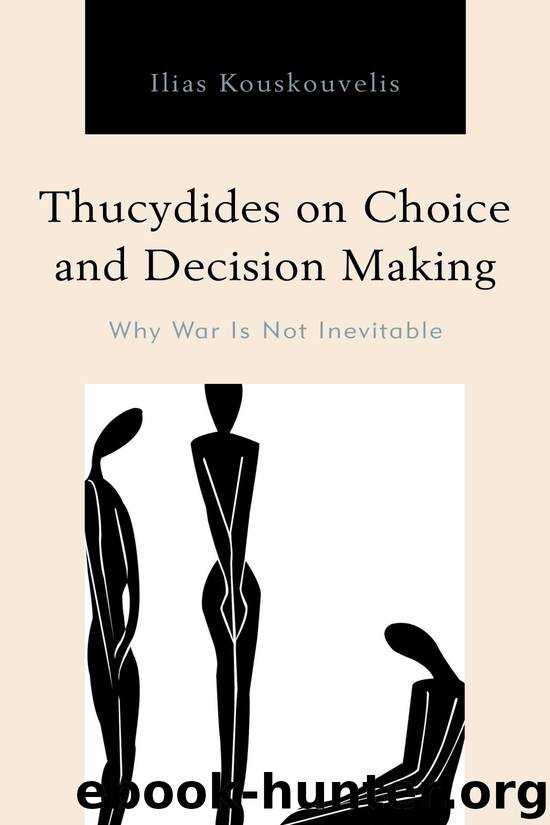Thucydides on Choice and Decision Making by Ilias Kouskouvelis

Author:Ilias Kouskouvelis
Language: eng
Format: epub
Publisher: Rowman & Littlefield Publishing
Chapter 5
The Thucydides’ Schema on Flawed Decision-Making
Thucydides’ thinking on why people take risks forms his second decision-making schema. As before, I begin by defining its content, and then I determine the nature of each of the factors influencing decisions, their causes, how they function and lead human behavior to errors; finally, wherever this emerges from the text, the possible ways of their management.
This second schema is found in verses 3.45.4-7 and is part of the oration by Diodotus, son of Eucrates.1 The oration refers to the case of the Mytilinean uprising and defection. Thucydides, having previously stated that all men, by their nature, both in private and in public affairs, are making mistakes («ἰδίᾳ και δημοσίᾳ ἁμαρτάνειν», 3.45.3), explains in a concise manner why and how people resort to violence and, beyond this, more broadly, why and how they take risks or are involved in dangerous situations, which leads to his thoughts on why and how they are driven to wrong decisions. The reader needs to pay close attention to the text and the way in which the newly emerging variables—boldness, arrogance, passions, hope, and chance—are connected with those included in the first schema, namely, necessity, human nature, and power, but also to the decision-making process:
[4] because of boldness caused by the necessity of poverty, (or) because of greed caused by the hubris or the confidence of power, or because of passions2 that each time more irresistibly possess them in the various circumstances, people are driven into risks.3 [5] In any case, desire4 and hope—the one precedes and the other follows, the first is planning the threat, the second submits the idea that chance is going to help—they are the most damaging and, while invisible, they are more powerful from the visible calamities. [6] Acting upon them, chance does not contribute less to driving people to arrogance; because sometimes chance appears unexpectedly and pushes some to risk with inferior means, and cities (to risk) the greatest goods, such as their freedom or their power over others, as each person and all together are unreasonably overestimating their forces. [7] It is simply impossible and very foolish to believe that human nature, when it wishes strongly to do something, can be prevented either by the power of law or by some other fear. (3.45)
Thucydides begins this dense paragraph with reference to the cause of necessity and ends it with the impressive generalization on the role and the irresistible power of human nature. New subjective variables arise simultaneously for the process and the decision itself, and the author attributes to most of these concepts their maximum intensity (value). The first is boldness that results from the necessity of poverty, and, in this case, can be understood as “temerity.” The second, greed, that is the willingness to satisfy their interests excessively, is caused by power, through hubris and self-confidence. Third, passions, feelings of excessive tension which are affected by and change according to the necessity of circumstance; in the text of The War, the
Download
This site does not store any files on its server. We only index and link to content provided by other sites. Please contact the content providers to delete copyright contents if any and email us, we'll remove relevant links or contents immediately.
| Arms Control | Diplomacy |
| Security | Trades & Tariffs |
| Treaties | African |
| Asian | Australian & Oceanian |
| Canadian | Caribbean & Latin American |
| European | Middle Eastern |
| Russian & Former Soviet Union |
The Secret History by Donna Tartt(16681)
The Social Justice Warrior Handbook by Lisa De Pasquale(11495)
Thirteen Reasons Why by Jay Asher(7810)
This Is How You Lose Her by Junot Diaz(5805)
Weapons of Math Destruction by Cathy O'Neil(5058)
Zero to One by Peter Thiel(4841)
The Myth of the Strong Leader by Archie Brown(4797)
Promise Me, Dad by Joe Biden(4462)
Beartown by Fredrik Backman(4446)
How Democracies Die by Steven Levitsky & Daniel Ziblatt(4430)
Stone's Rules by Roger Stone(4427)
The Fire Next Time by James Baldwin(4357)
100 Deadly Skills by Clint Emerson(4095)
A Higher Loyalty: Truth, Lies, and Leadership by James Comey(4045)
Rise and Kill First by Ronen Bergman(4029)
The David Icke Guide to the Global Conspiracy (and how to end it) by David Icke(3900)
The Farm by Tom Rob Smith(3884)
Secrecy World by Jake Bernstein(3793)
The Doomsday Machine by Daniel Ellsberg(3743)
